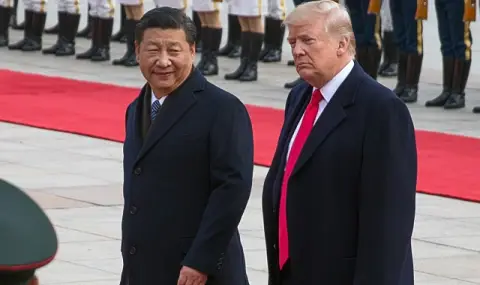The US has exempted electronic devices from the tariff increase. Trump apparently realized how much smartphones, for example, would cost more. However, tariffs on other products from China remain. What does this mean for trade?
Some electronic devices such as smartphones and computers will be exempted from the tariff increase, according to a memorandum issued by US President Donald Trump on Friday, April 11. This exemption affects about 20 products, including hard drives, semiconductors and flat screens, and also covers Chinese products for which particularly high new tariffs were introduced.
Thus, the Trump administration is apparently responding to concerns that the new tariffs could significantly increase the cost of smartphones, computers and other electronic devices for US consumers. Many of these products are manufactured in China.
Shortly before that - on Wednesday, April 9 - Trump announced a 90-day pause for most of the announced tariffs, but not for China. So far, the increases that Trump has imposed on Chinese goods total an additional 145 percent. Beijing responded to the latest spike in US tariffs with counter-tariffs of an additional 125 percent.
Recently, China has further expanded sanctions against US companies and further restricted exports of rare metals and critical raw materials, German public broadcaster ARD recalls. But this time the Chinese government did not announce any other measures, except for the increase in tariffs.
China: Tariffs will go down as "a joke in history"
Even before it became clear that the US would make an exception for tariffs on electronic devices, Foreign Ministry spokesman Lin Yiyan once again emphasized that China would not succumb to pressure. The Ministry of Commerce in Beijing has described the US tariffs as "abnormally high without practical economic significance". The tariffs would go down in history as "a joke".
Both countries have made it clear that they see no point in further tariff increases. But the latest additions of well over 100 percent, which remain in force for many goods, will also have a negative impact on trade, experts believe, as import prices from the other country have doubled, or even more.
The consequences are already being felt
The effect of the increases is already a fact, ARD points out. Cars that are produced in the US for the Chinese market can no longer be ordered in China, such as the "Tesla" models S and X. Chinese consumers will probably have to switch to electric vehicles made in China. "Tesla" also has a factory in the country.
When it comes to agricultural products, which make up the majority of imports from the US, China will probably switch to other countries. During Trump's first term, the country already created alternative supply chains and, for example, imports soybeans from Brazil. Trump then imposed punitive tariffs on China, the German public-law media outlet recalls.
However, China exports much more to the US than to other countries. Therefore, according to economic analyst Nick Maro, quoted by ARD, it will be much more difficult for the US to find alternatives.
Much of what China produces cannot be found anywhere else and is not produced in the US, Maro points out. This forces many importers to continue buying from China. "In the short term, this will lead to higher prices. In the medium and long term, the US will try to diversify and look for other sources," the analyst predicts.
Tariffs will not stimulate US manufacturing
Although the White House has now excluded electronic devices from the tariffs, including those made in China, the Trump administration continues to emphasize that American companies should be encouraged to move their production to the US. "President Trump has made it clear that America cannot rely on China to produce important technologies such as semiconductors, chips, smartphones and laptops," said Carly Leavitt, Trump's press secretary.
According to analyst Nick Marro, however, it is unrealistic for the US to start producing many of the goods imported from China itself. On the one hand, the costs of manufacturing in the US are very high. On the other hand, it is a job that many Americans would not want to do. Therefore, the analyst does not believe that tariffs will turn the US into a manufacturing hub.
The example of the technology company Apple clearly shows what is at stake: the American company produces 80% of its iPads and over half of its computers in China, which means that it would be severely affected by the tariffs. Apple is probably quite happy now that electronic devices are exempt from the tariff increase.
As for other types of goods, Chinese traders will now try to find routes to the US through neighboring countries, writes ARD. In addition, the depreciation of the Chinese currency will help manufacturers in China maintain their competitiveness.
